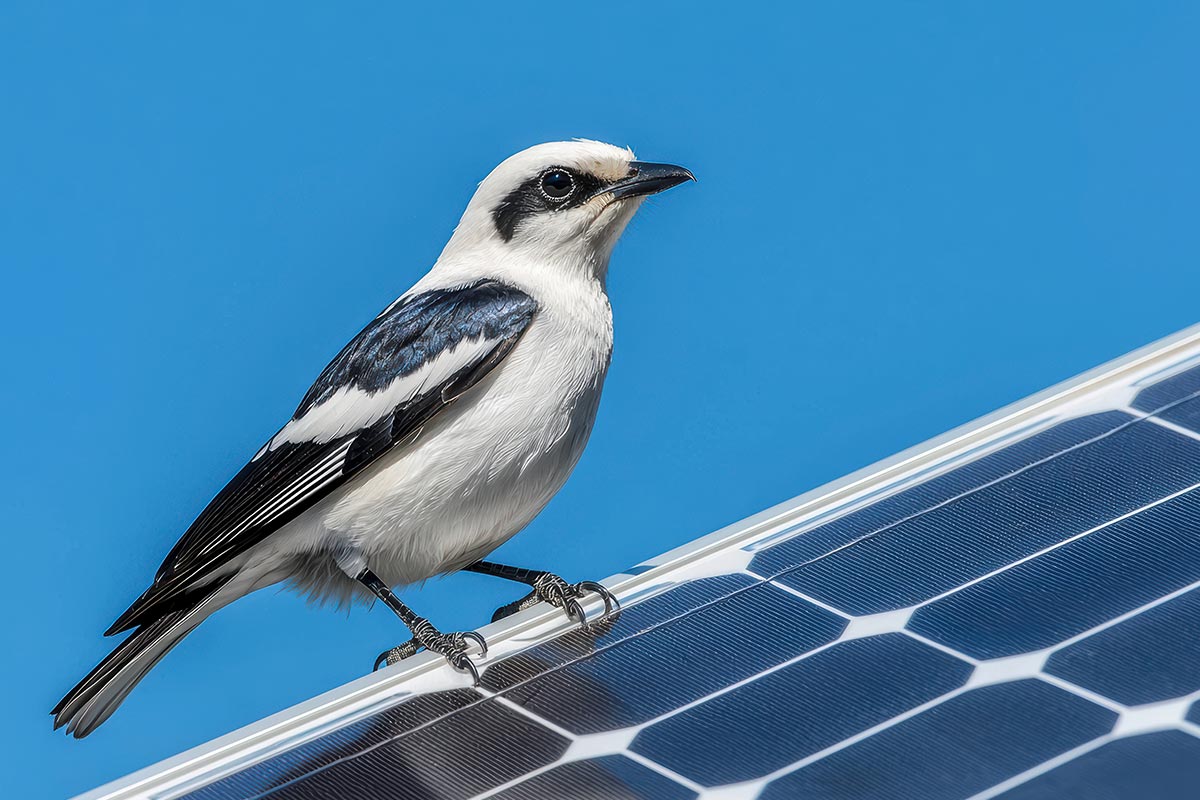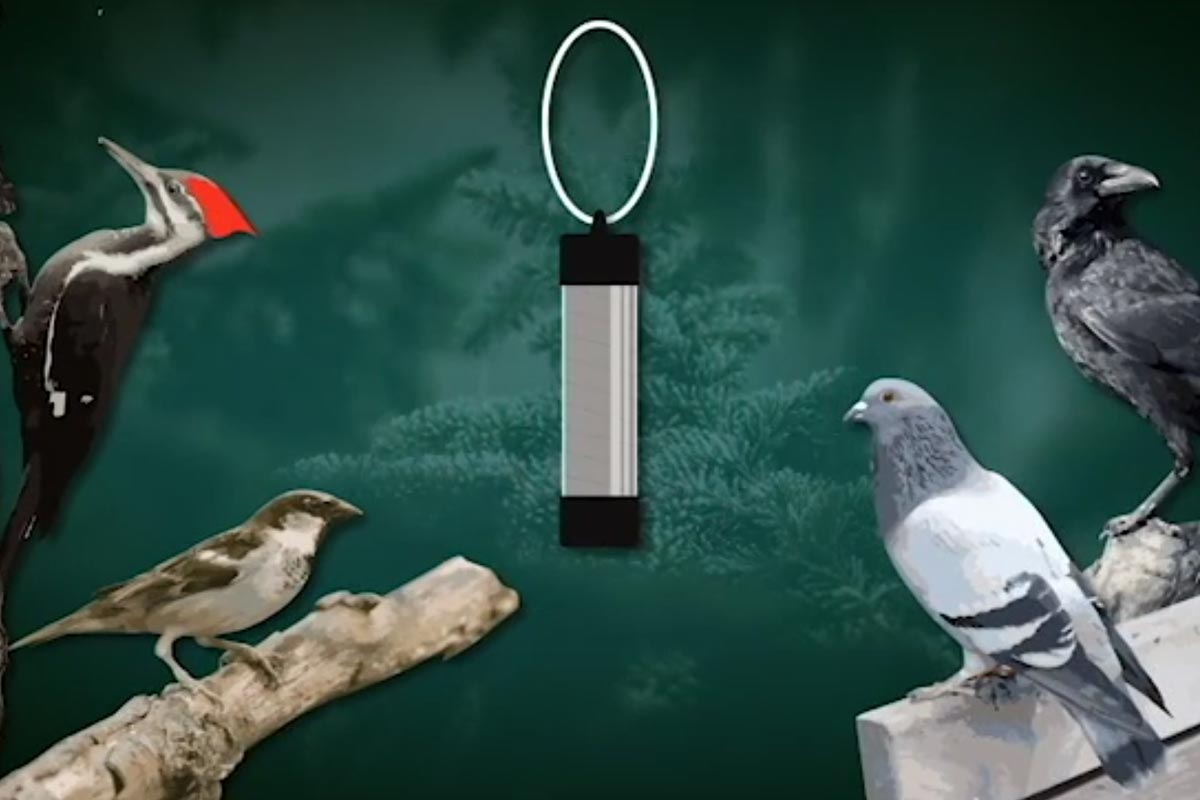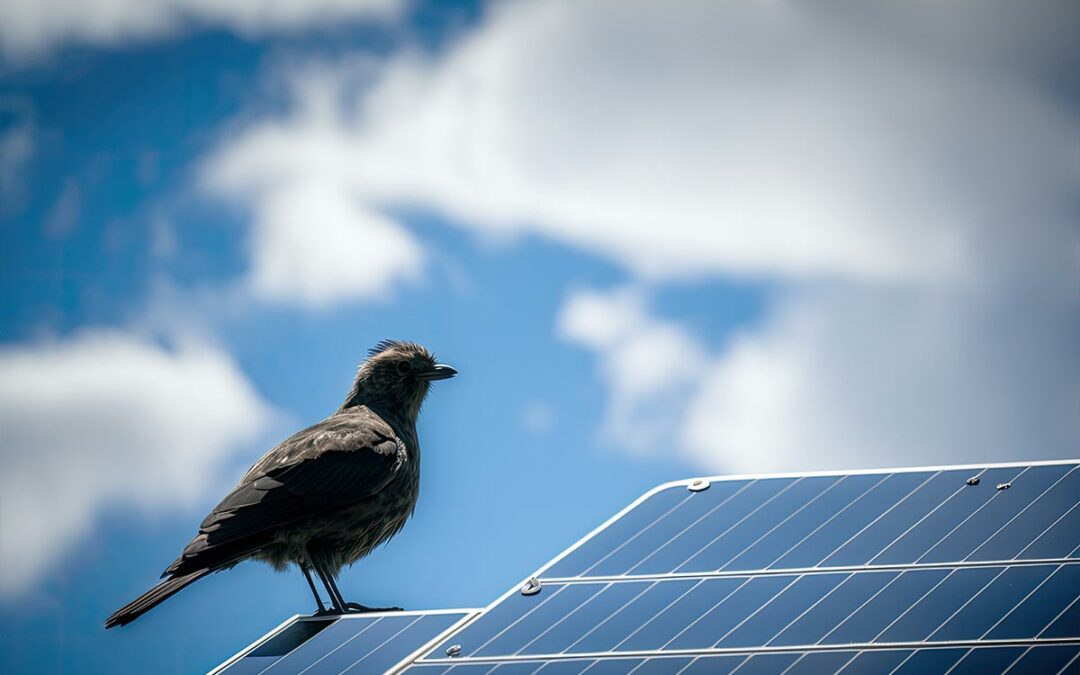
by Pigeon Patrol | Jun 26, 2025 | Animal Deterrent Products, Bird Deterrent Products, Pigeon Control, Pigeon Patrol's Services, Pigeons, Solar Panel Bird Proofing, Sparrows
Solar panels are an excellent investment—but they also attract unwanted tenants: pigeons. Birds love to nest underneath panels because they provide warmth, shade, and protection from predators.
If left unchecked, bird activity can lead to clogged gutters, wiring damage, reduced energy efficiency, and thousands in repairs. The good news? With proper solar panel bird proofing, you can protect your solar system and prevent infestations—all without harming the birds.
Why Do Birds Nest Under Solar Panels?
- Warm, Sheltered Space
Solar panels create the perfect microclimate—warm, dry, and shaded.
- Safety from Predators
Being under panels keeps pigeons out of reach of cats, hawks, and raccoons.
- Easy Access to Nesting Materials
Nearby trees, garbage, or roof gardens provide ample nesting material.
Dangers of Bird Nesting Under Solar Panels
- Wiring Damage – Birds chew and pull on cables
- Fire Risk – Nesting materials are flammable
- Reduced Efficiency – Debris and droppings cause panel shading
- Roof Damage – Moisture and droppings cause corrosion and leakage
- Health Hazards – Pigeon droppings carry histoplasmosis and salmonella
Solar Panel Bird Proofing Products
1. Bird Netting and Solar Mesh Guards
The most effective solution is to install UV-stabilized mesh or netting around the perimeter of the solar array.
Shop Bird Netting Here: https://www.pigeonpatrol.ca/bird-netting/
Benefits:
- Keeps birds from entering underneath panels
- Blends with roof aesthetics
- Weatherproof and long-lasting
- Can be DIY-installed or professionally fitted
2. Bird Spikes for Edges and Frames
Install spikes along the outer edge of solar panels to prevent birds from landing or walking around the system.
Explore Bird Spikes: https://www.pigeonpatrol.ca/bird-spikes/
Best for:
- Lower panel edges
- Surrounding rooftop ledges
- Gutter edges below panels
3. Ultrasonic Bird Repellers
Ultrasonic bird repellers emit high-frequency sound that’s unpleasant for birds but inaudible to humans.
Browse Ultrasonic Repellers: https://www.pigeonpatrol.ca/bird-repeller/
Use alongside netting for added protection.
How to Install Bird Proofing for Solar Panels
Step 1: Clean the Area
Remove all bird nests, droppings, and debris. Disinfect the area thoroughly.
Step 2: Install Mesh or Netting
Use solar mesh clips or roof-friendly fasteners to secure netting around the perimeter of the solar panel system.
Step 3: Add Bird Spikes or Repellers
Install spikes on exposed edges or install a repeller unit to deter future roosting attempts.
Step 4: Regular Maintenance
Inspect the proofing system every 6–12 months for wear and tear, especially after heavy storms.
Who Needs Solar Panel Bird Proofing?
- Homeowners with Rooftop Solar
Especially in urban or suburban areas with high pigeon populations.
- Commercial Properties with Solar Arrays
Warehouses, retail plazas, schools, or hospitals with rooftop solar systems.
- Solar Panel Installers & Property Managers
Protect client investments and reduce callbacks for bird-related service issues.
Combine Bird Proofing for Best Results
| Solution |
Purpose |
| Bird Netting |
Blocks access beneath panels |
| Bird Spikes |
Prevents landing or perching |
| Ultrasonic Devices |
Covers larger roof areas |
| Regular Cleaning |
Removes attraction sources (food, nesting material) |
Can birds damage solar panels?
Yes. Birds can damage wiring, reduce efficiency, and cause expensive roof damage.
What is the best way to bird-proof solar panels?
The most effective method is mesh or netting around the perimeter, combined with bird spikes and ultrasonic deterrents.
How long does solar panel bird proofing last?
Pigeon Patrol’s mesh and netting systems are rated for 5–10 years or longer.
Will this hurt the birds?
No. All products are humane, non-toxic, and environmentally safe.
Bird-proofing your solar panels is a small investment that protects your energy system, roof, and health. Whether you’re a homeowner or a building manager, the best time to act is before pigeons move in.
Shop bird control products now at: https://www.pigeonpatrol.ca
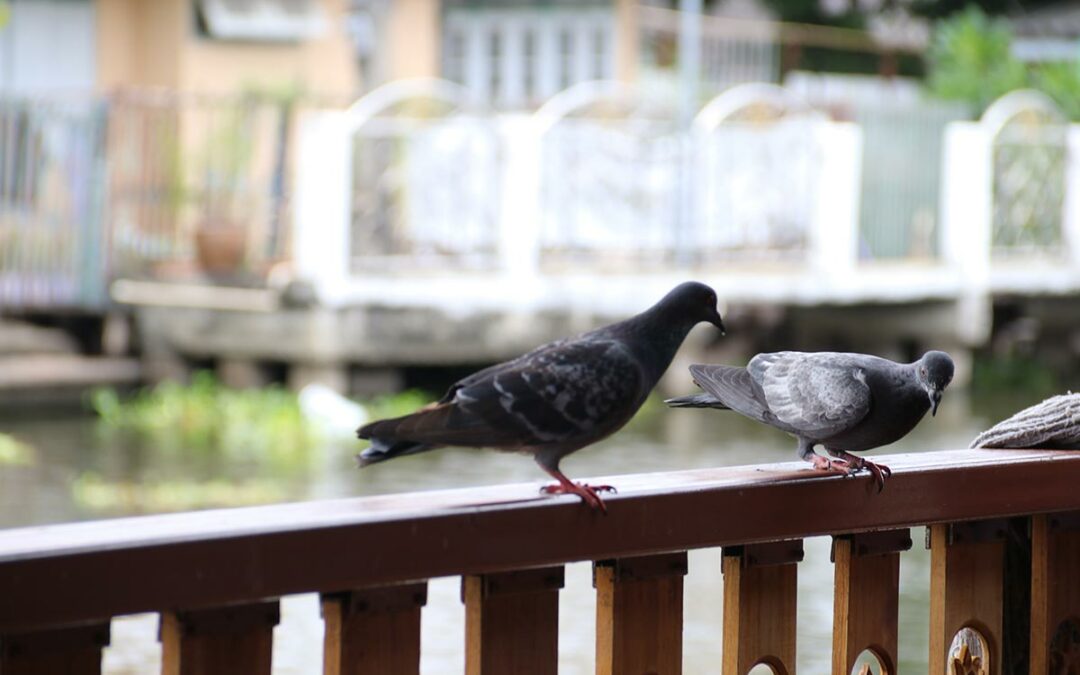
by Pigeon Patrol | Jun 23, 2025 | Animal Deterrent Products, Bird Deterrent Products, Magnetic Bird Defender, Pigeon Control, Pigeon Patrol's Services, Pigeons, Sparrows
If you live in a condo or apartment, you know how frustrating it is when pigeons take over your balcony. They leave droppings, feathers, and nesting materials, turning your relaxing outdoor space into a dirty, unsanitary mess.
Fortunately, pigeon control for balconies is not only possible—it’s easy, affordable, and completely humane. In this article, we’ll walk you through the best ways to deter pigeons from your balcony, using proven products from Pigeon Patrol.
Why Pigeons Love Balconies
Balconies are perfect roosting spots for pigeons because they offer:
- Shelter from wind and rain
- Proximity to food sources
- Ideal nesting areas behind furniture, BBQs, and planters
- Quiet, undisturbed locations
Problems Pigeons Cause on Balconies
- Health Hazards
Pigeon droppings carry fungi, bacteria, and parasites that can cause:
- Histoplasmosis
- E. coli
- Salmonella
- Structural Damage
Their acidic waste corrodes concrete, railings, and balcony furniture.
- Mess and Odor
Feathers, nesting materials, and droppings smell bad and look worse.
Best Pigeon Control Products for Balconies
1. Bird Spikes for Railings and Ledges
Bird spikes are an effective physical barrier to keep pigeons from landing or perching on your railing.
Shop Bird Spikes: https://www.pigeonpatrol.ca/bird-spikes/
Benefits:
- Easy to install with adhesive
- 100% humane
- Long-lasting and weatherproof
2. Pigeon Netting for Full Enclosure
Netting creates a complete barrier that blocks pigeons from flying in at all.
Browse Balcony Netting: https://www.pigeonpatrol.ca/bird-netting/
Best for:
- Balconies with multiple open sides
- High-rise apartments
- Ongoing infestations
3. Ultrasonic Bird Repellers
These devices emit high-frequency sound that pigeons can’t stand—but you can’t hear.
View Ultrasonic Repellers: https://www.pigeonpatrol.ca/bird-repeller/
Ideal for:
- Urban condos
- Small or medium-sized balconies
- Residents looking for low-visibility options
4. Balcony Fence Spikes and Barriers
Perfect for fence tops, planters, or railing edges where pigeons try to land.
Check Out Fence Spikes: https://www.pigeonpatrol.ca/de-fence-wall-spikes/
5. Magnetic Bird Defender (Balcony)
Magnetic bird repellers have proven successful in preventing birds from flying into specific areas. A strong magnetic force interferes with birds sense of direction which confuses and disorientates pest birds, causing them to leave the area effected. These are excellent pigeon deterrents.
Check Out Magnetic Bird Defender: https://www.pigeonpatrol.ca/product/magnetic-bird-defender/
How to Pigeon-Proof Your Balcony – Step-by-Step
Step 1: Clean the Area
Remove all droppings, nesting materials, and debris. Sanitize thoroughly.
Step 2: Install Barriers
Apply spikes to railings and ledges, or install netting across the open areas.
Step 3: Use a Repeller
Place an ultrasonic device or sound deterrent to add another layer of defense.
Step 4: Remove Attractants
Eliminate open food, water, or cozy nooks where pigeons may try to nest.
Bonus Tips for Pigeon-Free Balconies
- Avoid feeding other birds—it attracts pigeons
- Remove cushions or cover furniture when not in use
- Use motion-activated deterrents if spikes and netting aren’t enough
- Don’t use fake owls unless you move them regularly (pigeons will learn they’re fake)
Why Choose Pigeon Patrol for Balcony Pigeon Control?
- Serving BC’s Lower Mainland for 15+ years
- All products are safe, humane, and discreet
- Trusted by property managers, homeowners, and condo associations
- Fast shipping and professional advice
Are bird spikes legal to use on balconies?
Yes. They’re completely legal, humane, and used on buildings worldwide.
Can I install pigeon netting myself?
Yes, but if you’re unsure, a professional installer will ensure full coverage with no gaps.
Will the deterrents harm birds?
No. All solutions are non-lethal and environmentally safe.
How quickly do pigeons leave after deterrents are installed?
Often within days—but it depends on how long they’ve nested. Older infestations may take longer.
If pigeons have made your balcony their home, it’s time to
take it back. With a combination of
spikes, netting, and ultrasonic repellers, you can
enjoy your outdoor space again—clean, quiet, and bird-free.
Get started today with balcony pigeon control products from: https://www.pigeonpatrol.ca
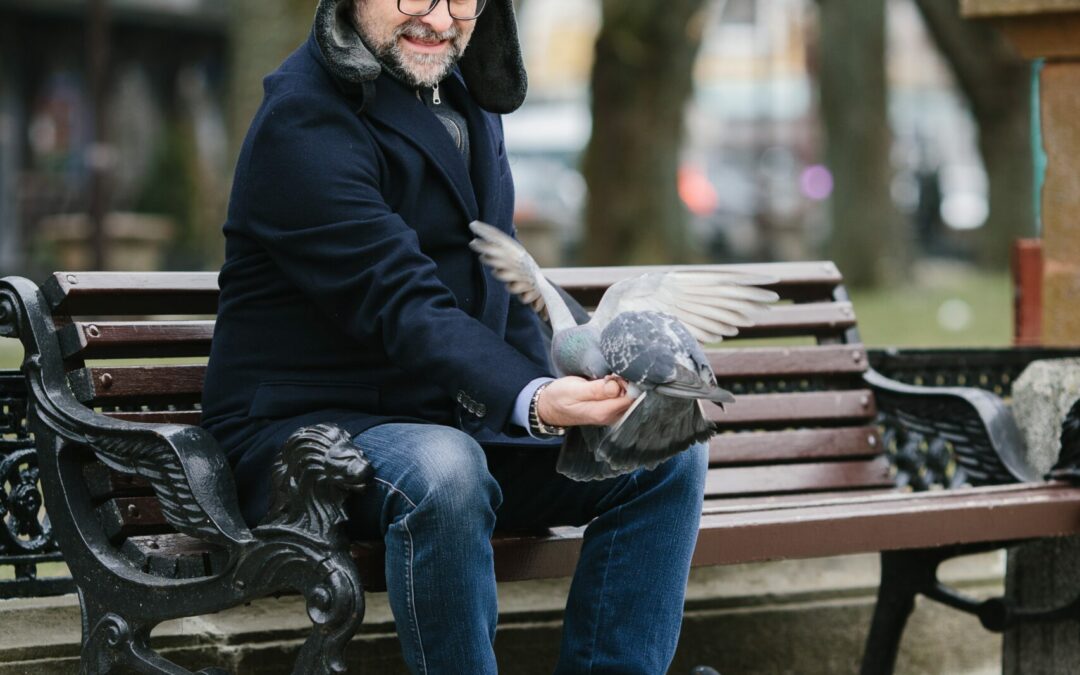
by Pigeon Patrol | Jun 8, 2025 | Bird Law, Bird Trap, Pigeon Control, Pigeon Droppings, Pigeon Patrol's Services
Commuters at the Jackson CTA Station experienced unusual delays this morning—not because of technical malfunctions, but because of an unexpected menace: pigeon droppings.
Two riders slipped and fell on the southbound platform around 8 a.m., prompting a temporary halt in service while janitorial crews responded. No major injuries were reported, but the incident has raised questions about safety and sanitation in public transit spaces.
“The smell hits you first,” said Mark Ellis, a daily commuter. “Then you see the mess—droppings everywhere. Benches, railings, even the signs. It’s gotten out of hand.”
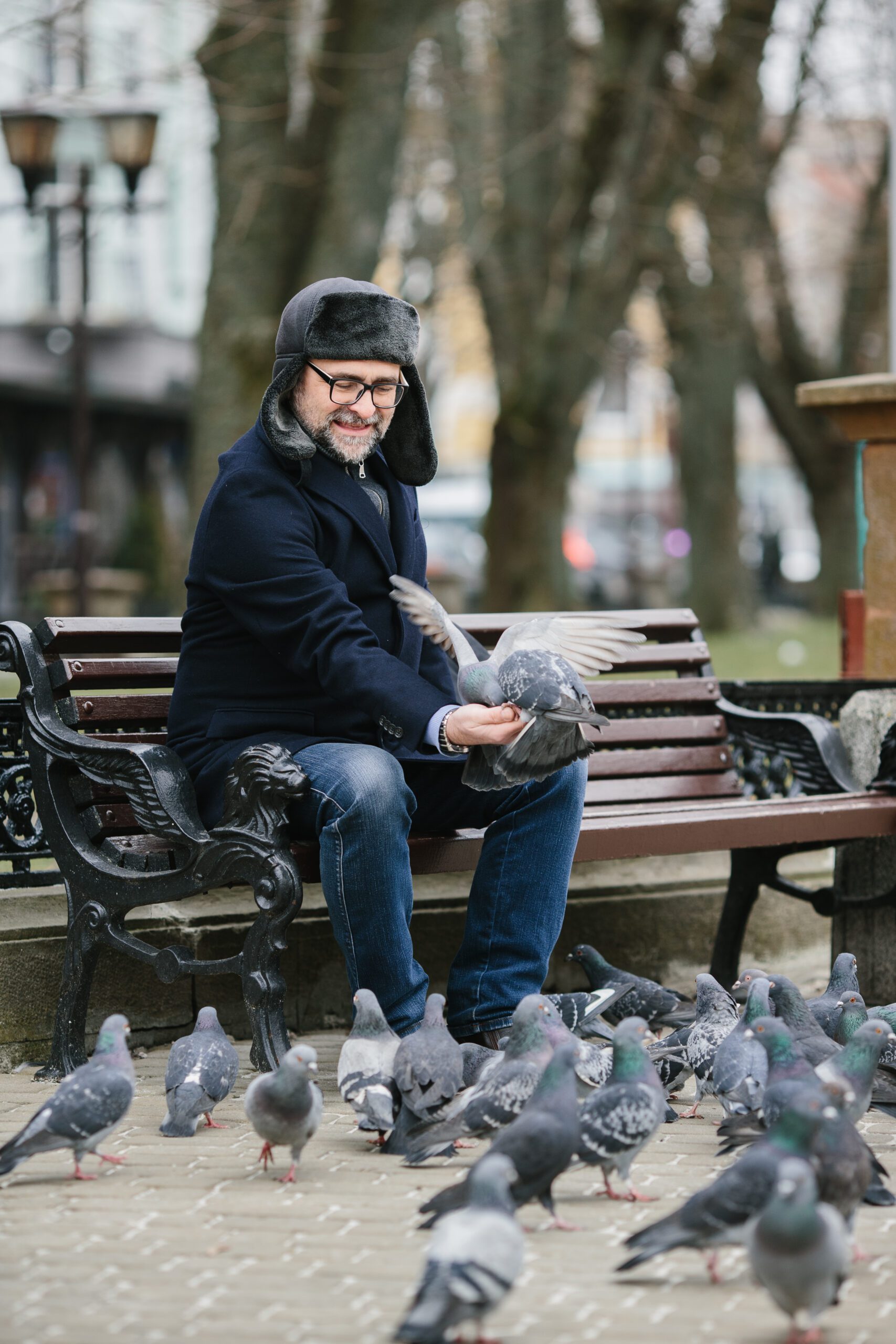
An elderly man enjoys a cold winter morning in the city.
Transit authorities said the problem has been building for months. Pigeons roost in the station’s rafters, undeterred by current pest control measures. According to CTA spokesperson Nia Harrell, “We’re working on a long-term plan that includes physical deterrents, more frequent cleanings, and consultation with pest control specialists.”
Harrell added that the CTA is exploring ethical deterrent methods like reflective strips, ultrasonic devices, and even using trained birds of prey in partnership with local falconers.
Pigeon Patrol Products & Services is the leading manufacturer and distributor of bird deterrent (control) products in Canada. Pigeon Patrol products have solved pest bird problems in industrial, commercial, and residential settings since 2000, by using safe and humane bird deterrents with only bird and animal -friendly solutions. At Pigeon Patrol, we manufacture and offer a variety of bird deterrents, ranging from Ultra-flex Bird Spikes with UV protection, Bird Netting, 4-S Bird Gel and the best Ultrasonic and audible sound devices on the market today.
Best Types of Pigeon Repellent
- Bird Spikes– Pigeons can’t land on surfaces with bird spikes—perfect for ledges, sills, signs, and fences.
Shop Bird Spikes: https://www.pigeonpatrol.ca/bird-spikes/
- Bird Sound Deterrents / Ultrasonic Repellers– Emit high-frequency sound to drive pigeons away without harming them.
Browse Ultrasonic Bird Repellers: https://www.pigeonpatrol.ca/bird-repeller/
- Pigeon Netting– Blocks pigeons from accessing nesting zones permanently.
See Pigeon Netting: https://www.pigeonpatrol.ca/bird-netting/
Canada’s top wholesaler for bird deterrent products for twelve consecutive years.
Contact us at 1- 877– 4– NO-BIRD, (604) 585-9279 or visit our website at https://www.pigeonpatrol.ca/
Bird Gone, Pigeon Gone, Pigeon problems, pigeon spikes, 1-877-4NO-BIRD, 4-S Gel, Bird Control, Pigeon Control, bird repellent, Bird Spikes, sonic bird repellent, stainless steel bird spikes, bird spikes Vancouver, Ultra Sonic Bird Control, Bird Netting, Plastic Bird Spikes, Canada bird spike deterrents, Pigeon Pests, B Gone Pigeon, Pigeon Patrol, pest controller, pest control operator, pest control technician, Pigeon Control Products, humane pigeon spikes, pigeon deterrents, pigeon traps, Pigeon repellents, Sound & Laser Deterrents, wildlife control, raccoon, skunk, squirrel deterrent, De-Fence Spikes, Dragons Den, Pigeon, Pigeon Patrol, Pigeons Roosting, Vancouver Pigeon Control, Bird Spikes, Bird Control, Bird Deterrent, Pigeon Deterrent, Surrey Pigeon Control, Pest, Seagull deterrent Vancouver Pigeon Blog, Birds Inside Home De-fence, Pigeon Nesting, Bird Droppings, Pigeon Dropping, woodpecker control, Keep The Birds Away, Birds/rats, seagull, pigeon, woodpecker, dove, sparrow, pidgeon control, pidgeon problem, pidgeon control, flying rats, pigeon Problems, bird netting, bird gel, bird spray, bird nails, bird guard, Pigeon control, Bird deterrents, Pigeon deterrents, Bird control, solutions, Pigeon prevention, Pigeon repellent, Bird proofing, Pest bird management, Pigeon spikes, Bird netting, Humane bird control, Bird exclusion, Urban bird control, Anti-roosting devices, Pigeon removal, Bird barriers
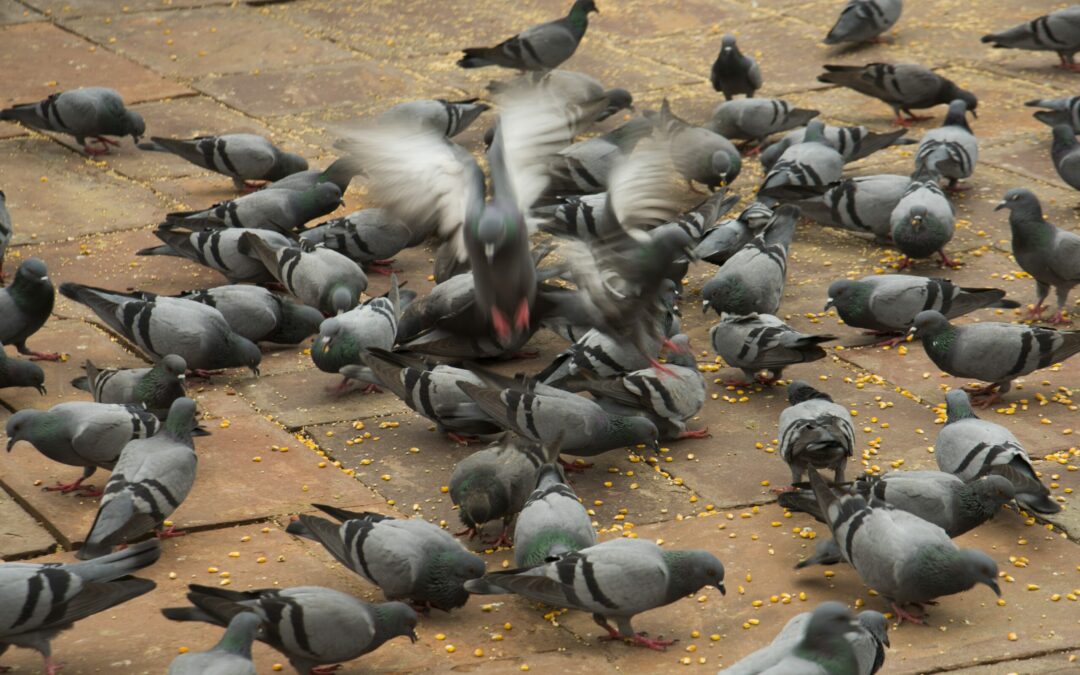
by Pigeon Patrol | Jun 8, 2025 | Bird Deterrent Products, Pigeon Control, Pigeon Droppings, Pigeon Patrol's Services
Roosevelt Middle School is facing a crisis that has nothing to do with test scores or staffing—it’s pigeons. Dozens of the birds have taken up residence on the school roof, leaving droppings throughout outdoor hallways, handrails, and the student quad.
“I’m scared my daughter will catch something,” said Delia Morales, mother of a 6th grader. “They eat lunch out there! There’s poop on the tables every day.”
The school’s janitorial staff reports spending hours daily trying to hose down surfaces before students arrive. Despite this, children have reportedly stepped in droppings, and some even reported seeing pigeons nesting inside a broken roof vent near the gymnasium.
Principal Tom Ferris acknowledged the growing concerns at a PTA meeting last Thursday. “We’re requesting emergency funds to install bird netting and roof barriers,” he said. “We’re also consulting with environmental safety inspectors to make sure there’s no health risk.”
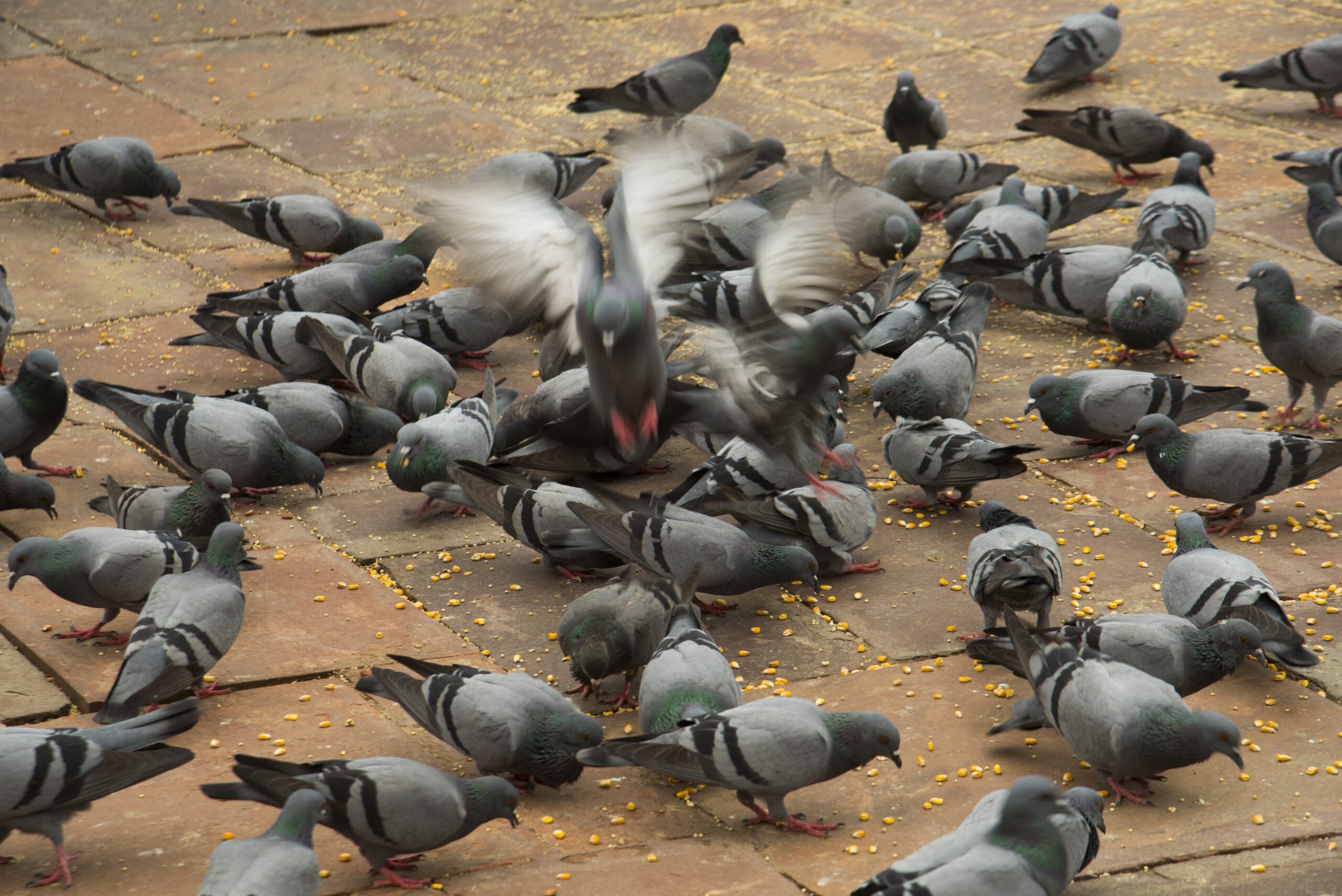
lots of pigeons gathering for food
Parents are organizing a volunteer cleanup day while pushing the district to take faster action. “This isn’t just a nuisance anymore—it’s a hazard,” said PTA President Carla Hsu.
Pigeon Patrol Products & Services is the leading manufacturer and distributor of bird deterrent (control) products in Canada. Pigeon Patrol products have solved pest bird problems in industrial, commercial, and residential settings since 2000, by using safe and humane bird deterrents with only bird and animal -friendly solutions. At Pigeon Patrol, we manufacture and offer a variety of bird deterrents, ranging from Ultra-flex Bird Spikes with UV protection, Bird Netting, 4-S Bird Gel and the best Ultrasonic and audible sound devices on the market today.
Best Types of Pigeon Repellent
- Bird Spikes– Pigeons can’t land on surfaces with bird spikes—perfect for ledges, sills, signs, and fences.
Shop Bird Spikes: https://www.pigeonpatrol.ca/bird-spikes/
- Bird Sound Deterrents / Ultrasonic Repellers– Emit high-frequency sound to drive pigeons away without harming them.
Browse Ultrasonic Bird Repellers: https://www.pigeonpatrol.ca/bird-repeller/
- Pigeon Netting– Blocks pigeons from accessing nesting zones permanently.
See Pigeon Netting: https://www.pigeonpatrol.ca/bird-netting/
Canada’s top wholesaler for bird deterrent products for twelve consecutive years.
Contact us at 1- 877– 4– NO-BIRD, (604) 585-9279 or visit our website at https://www.pigeonpatrol.ca/
Bird Gone, Pigeon Gone, Pigeon problems, pigeon spikes, 1-877-4NO-BIRD, 4-S Gel, Bird Control, Pigeon Control, bird repellent, Bird Spikes, sonic bird repellent, stainless steel bird spikes, bird spikes Vancouver, Ultra Sonic Bird Control, Bird Netting, Plastic Bird Spikes, Canada bird spike deterrents, Pigeon Pests, B Gone Pigeon, Pigeon Patrol, pest controller, pest control operator, pest control technician, Pigeon Control Products, humane pigeon spikes, pigeon deterrents, pigeon traps, Pigeon repellents, Sound & Laser Deterrents, wildlife control, raccoon, skunk, squirrel deterrent, De-Fence Spikes, Dragons Den, Pigeon, Pigeon Patrol, Pigeons Roosting, Vancouver Pigeon Control, Bird Spikes, Bird Control, Bird Deterrent, Pigeon Deterrent, Surrey Pigeon Control, Pest, Seagull deterrent Vancouver Pigeon Blog, Birds Inside Home De-fence, Pigeon Nesting, Bird Droppings, Pigeon Dropping, woodpecker control, Keep The Birds Away, Birds/rats, seagull, pigeon, woodpecker, dove, sparrow, pidgeon control, pidgeon problem, pidgeon control, flying rats, pigeon Problems, bird netting, bird gel, bird spray, bird nails, bird guard, Pigeon control, Bird deterrents, Pigeon deterrents, Bird control, solutions, Pigeon prevention, Pigeon repellent, Bird proofing, Pest bird management, Pigeon spikes, Bird netting, Humane bird control, Bird exclusion, Urban bird control, Anti-roosting devices, Pigeon removal, Bird barriers
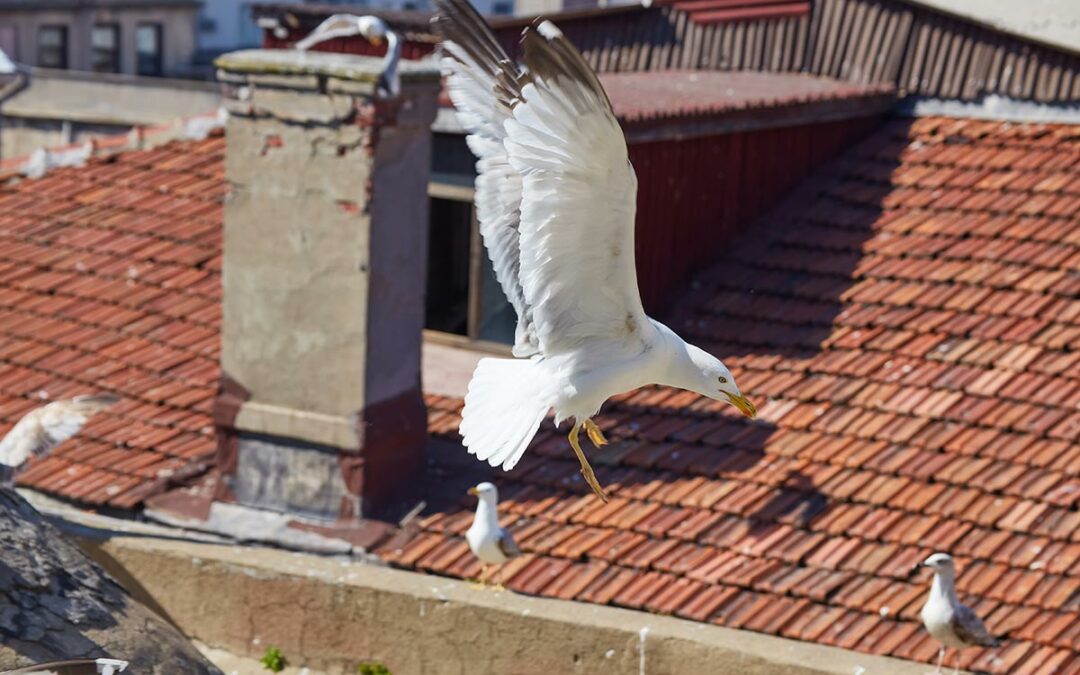
by Pigeon Patrol | Jun 4, 2025 | Animal Deterrent Products, Bird Deterrent Products, Bird Netting, Bird Spikes, Fence Spikes, Pigeon Control, Pigeon Patrol's Services, Pigeon Spikes, Pigeons, Sparrows, UltraSonic Bird Control
Pigeons are persistent birds—once they decide to roost, they can cause property damage, health hazards, and messy cleanup. The good news? You have lots of effective pigeon repellent options to choose from.
In this guide, we’ll cover the top pigeon repellents, when to use them, and how to combine products for the best results.
Best Types of Pigeon Repellent
- Bird Spikes – Pigeons can’t land on surfaces with bird spikes—perfect for ledges, sills, signs, and fences.
Shop Bird Spikes: https://www.pigeonpatrol.ca/bird-spikes/
- Bird Sound Deterrents / Ultrasonic Repellers – Emit high-frequency sound to drive pigeons away without harming them.
Browse Ultrasonic Bird Repellers: https://www.pigeonpatrol.ca/bird-repeller/
- Pigeon Netting – Blocks pigeons from accessing nesting zones permanently.
See Pigeon Netting: https://www.pigeonpatrol.ca/bird-netting/
Where to Apply Pigeon Repellents
- Residential properties—balconies, rooftops, window sills
- Commercial spaces—storefronts, parking garages, rooftops
- Industrial & agricultural buildings—warehouses, silos, barns
How to Combine Pigeon Repellents
- Bird spikes for landing prevention
- Pigeon net for blocking access
- Ultrasonic sound deterrents for wide-area repelling
- Add visual deterrents (reflective tape, predator decoys) for extra impact
What is the most effective pigeon repellent?
Bird spikes + netting + ultrasonic devices offer the most comprehensive protection.
Are pigeon repellents safe for other birds?
Yes—our products are designed to deter all pest birds humanely.
Choosing the right pigeon repellent depends on your property, level of infestation, and budget. Often, the best solution is a multi-layered approach using spikes, netting, and sound deterrents.
Shop the best pigeon repellents today at: https://www.pigeonpatrol.ca
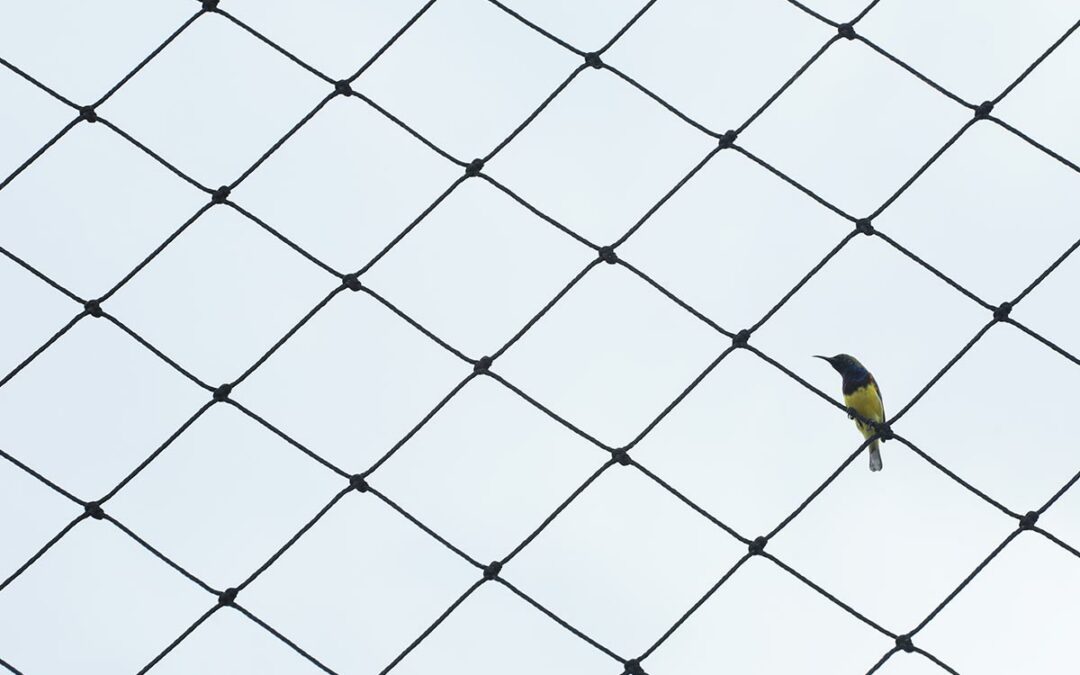
by Pigeon Patrol | Jun 4, 2025 | Animal Deterrent Products, Bird Deterrent Products, Bird Netting, Pigeon Control, Pigeon Patrol's Services, Pigeons, Sparrows
If you want to stop pigeons from nesting entirely, a pigeon net is one of the most reliable and long-lasting solutions. Bird netting physically blocks birds from accessing protected spaces—without harming them.
In this guide, you’ll learn when to use pigeon netting, how it works, and which areas of your property will benefit most from this type of bird control.
What Is Pigeon Netting?
Pigeon netting is UV-stabilized mesh designed to keep birds out of specific areas: balconies, rooftops, parking garages, and commercial spaces.
Shop Bird Netting: https://www.pigeonpatrol.ca/bird-netting/
Benefits of Pigeon Netting
- 100% humane—prevents nesting without harming birds
- Durable—withstands rain, snow, wind, UV rays
- Discreet appearance—nearly invisible from a distance
- Protects large or oddly shaped areas
- Low-maintenance & long-lasting
Where to Install Pigeon Netting
- Balconies & patios
- Roof overhangs & HVAC units
- Parking garages & warehouses
- Solar panels
- Under building signage
How to Install Pigeon Netting
- Inspect the area & measure dimensions
- Install anchor points (eye bolts or brackets)
- Stretch net taut across opening
- Seal edges with zip ties or clips
- Check for gaps to ensure birds can’t sneak in
Is pigeon netting permanent?
Yes—when installed correctly, netting can last 5–10+ years.
Can pigeons break through netting?
No—Pigeon Patrol’s netting is heavy-duty and pigeon-proof.
A pigeon net is one of the most effective bird control products for keeping spaces 100% bird-free. For large commercial properties or high-infestation zones, netting is a must.
Explore pigeon netting solutions at: https://www.pigeonpatrol.ca/bird-netting/

